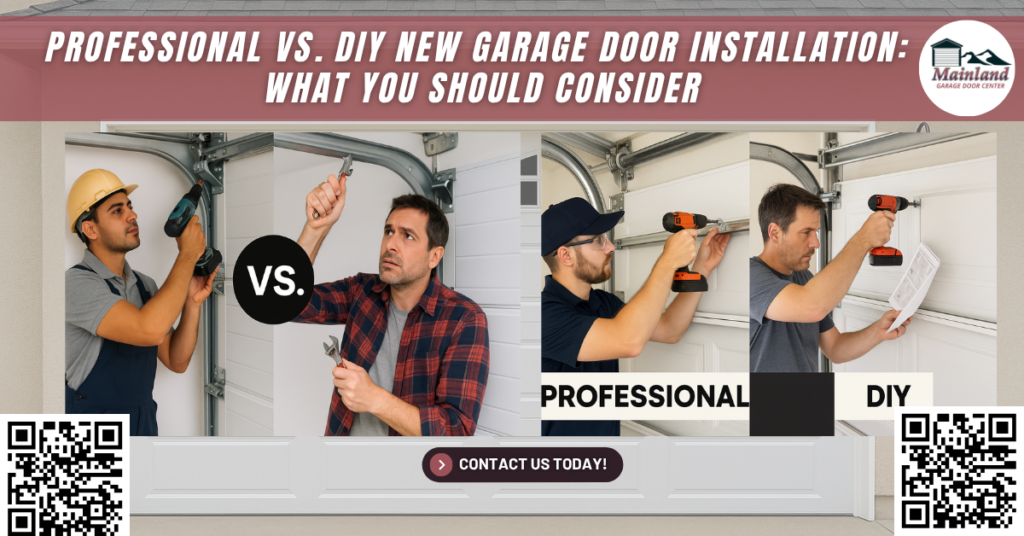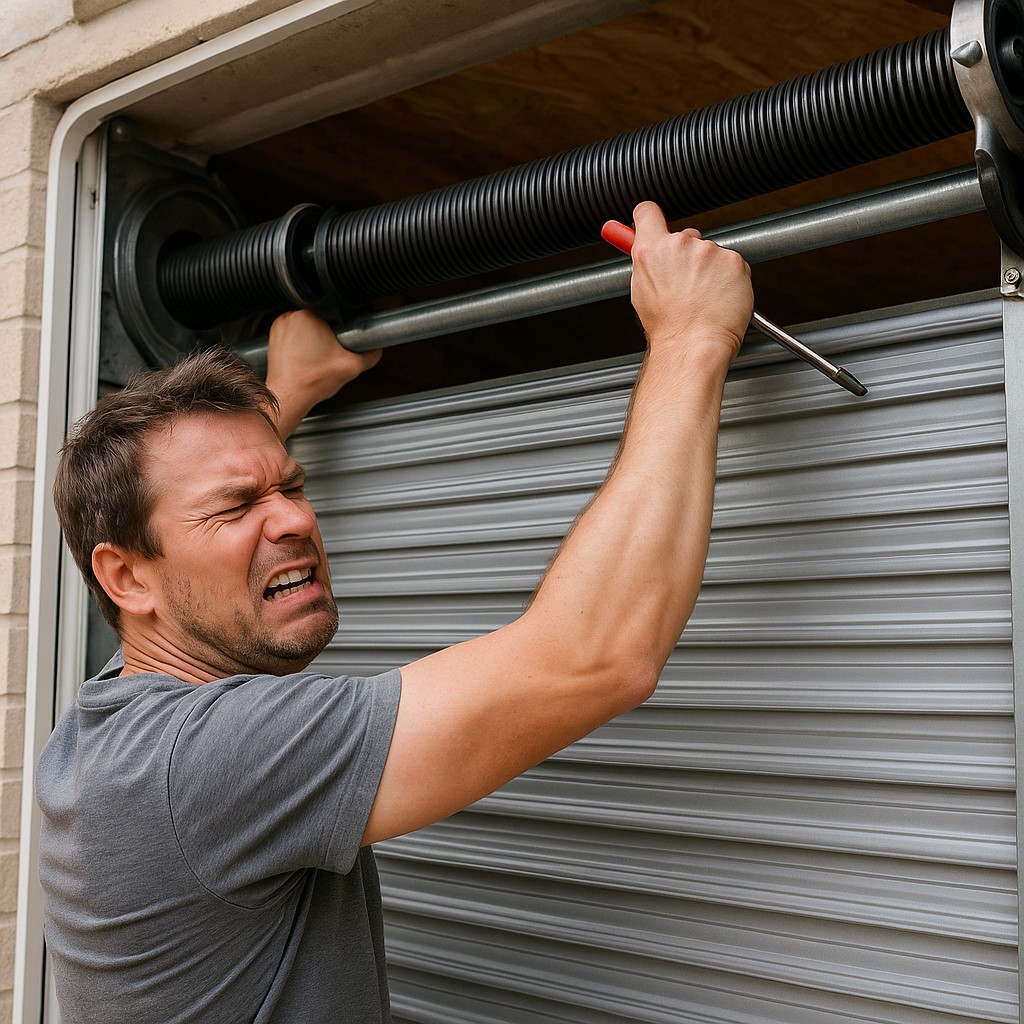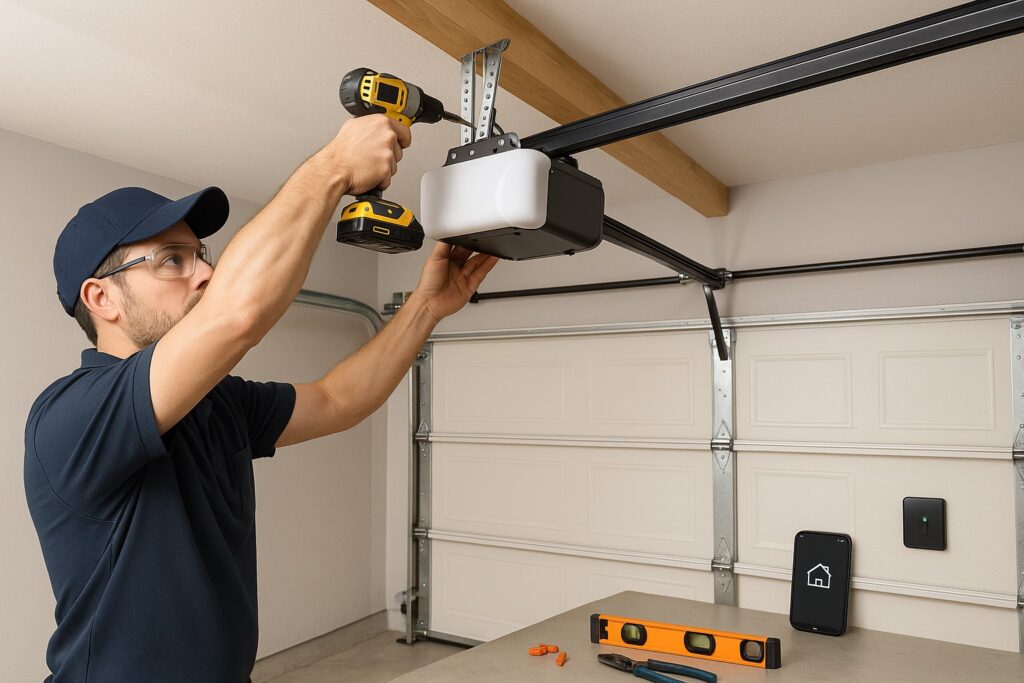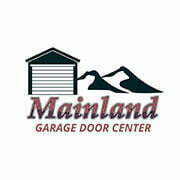Professional vs. DIY New Garage Door Installation: What You Should Consider

Real-Life Insight and Why This Topic Matters
A few months ago, our team at Mainland Garage Door Center responded to an emergency call from a homeowner in Texas City. He had attempted a new garage door installation over the weekend using parts from a hardware store and a popular online video guide. Unfortunately, during the installation process, the torsion spring snapped, the tracks were installed unevenly, and the garage door opener was not compatible with the panel system he purchased. The result? A bent steel door, damaged door panels, and a complete reinstallation by our professional installation team, plus higher labor costs than if he had contacted us first.
Statistics from industry experts show that more than 20,000 garage door-related injuries occur annually, most of which are linked to improper installation or neglected maintenance. Garage doors are large, heavy, and intricately designed systems that require precise alignment, calibrated spring tension, and the integration of safety sensors and opener systems to ensure smooth operation and secure home access. These are not projects to approach casually or without experience.
Whether you’re replacing an old garage door, upgrading for better energy efficiency, or customizing a door for enhanced curb appeal, it’s crucial to understand the pros and cons of DIY vs. professional installation. This guide explores everything you need to consider, from labor costs and materials to security features and energy savings, before installing your next new garage door. We aim to help homeowners and business owners make an informed decision that balances cost, safety, aesthetics, and long-term performance.
Common Mistakes Homeowners Make During DIY Installation
Even with the best intentions, DIYers frequently encounter serious challenges during garage door installation. Below are the most common pitfalls:
1. Incorrect Spring Tension
Garage doors rely on properly calibrated torsion or extension springs to counterbalance the door’s weight. Incorrect tension can result in the door either snapping open or being too heavy to lift. This issue compromises safety and increases wear on the opener and other components. Additionally, incorrect tension may cause the door to slam shut or bounce back unpredictably, posing risks to people and property. Over time, improper tension reduces the lifespan of the entire system, leading to frequent breakdowns and costly repairs.
2. Misaligned Tracks and Hardware
Aligning the vertical and horizontal tracks requires precision. Even minor misalignment causes the door to drag, jam, or produce excessive noise. Over time, misalignment leads to uneven wear on rollers and hinges and can eventually damage the door panels or opener system. Proper alignment ensures smooth gliding of the rollers and balanced pressure across the door structure. Failing to achieve this can result in structural damage and inconsistent movement.

3. Improper Opener Compatibility
Choosing an opener without accounting for the door’s weight, material, or size often leads to inadequate performance. For instance, using a standard chain drive for a heavy, insulated steel door can cause the motor to overheat and fail. Compatibility issues also prevent smart features from working correctly and limit the system’s functionality. It’s essential to match the horsepower, drive type, and feature set of the opener to the specific door system.
4. Neglecting Safety Features
Modern garage doors are designed with multiple safety mechanisms such as auto-reverse systems, motion detectors, and safety sensors. DIY installers often skip or incorrectly install these features, significantly increasing the risk of injury and property damage. Improper installation can also make it harder to diagnose issues during operation, such as why a door refuses to close or opens unexpectedly.
5. Missing Final Adjustments
Final tuning is essential to achieving a balanced, weather-sealed, and smooth-operating door. These adjustments include calibrating the opener’s force settings, checking the spring balance, and ensuring tight seals. Skipping these steps results in noise, poor insulation, and operational inefficiencies. Over time, a lack of fine-tuning accelerates wear and tear and may cause the door to shift out of alignment.
When DIY Installation Might Be Okay
While professional installation is almost always the safer and more efficient option, there are limited scenarios where a DIY approach might be reasonable:
- Basic Roll-Up Doors: These are simpler to install and typically require less technical skill and fewer safety components. They have fewer moving parts and often come with straightforward instructions.
- Detached Garages: Since they are not attached to the home, security and noise are less critical. Mistakes in insulation or noise suppression have less impact in standalone structures.
- Lightweight Materials: Single-panel doors without insulation or smart technology have fewer moving parts and are easier to handle. Aluminum or hollow-core doors pose less of a physical risk during installation.
- Experience and Tools: Homeowners with construction or electrical backgrounds and access to professional-grade tools might manage basic installations safely. This includes knowledge of torque, cable systems, and circuit testing for opener integration.
Even in these cases, it’s still wise to consult with a garage door professional to verify compatibility and safety. A short inspection or consultation could save thousands in potential rework.
Local Environment Factors for Texas City, TX
Texas City presents unique environmental challenges that influence garage door selection and installation:
High Humidity and Salt Exposure
Being close to the Gulf Coast, garage doors here are exposed to excessive moisture and salt air, which accelerates rust and corrosion. Recommended features include:
- Galvanized or powder-coated steel
- Rust-resistant hinges, tracks, and hardware
- Fiberglass doors with reinforced structural integrity
These materials extend the lifespan of your garage door by resisting the corrosive elements commonly found in coastal areas. In addition, weather stripping and seals need to be more robust to cope with constant dampness.
Hurricane and Wind Concerns
Texas City is subject to strong winds and tropical storms, making wind resistance a key concern. To comply with safety regulations and protect property, we suggest:
- Wind-rated garage doors certified to Texas coastal codes
- Reinforced panels and torsion springs
- Secure anchoring systems using durable brackets and steel framing
These features not only ensure compliance with local building codes but also provide added peace of mind during hurricane season.
Energy Efficiency
With hot, humid summers, insulated garage doors significantly reduce energy costs and improve indoor climate control. Insulation options like polyurethane and polystyrene enhance:
- R-value ratings
- Resistance to thermal transfer
- Comfort inside the adjacent rooms
Insulated doors help maintain temperature consistency in homes with attached garages, reducing HVAC strain and lowering utility bills.
Residential vs. Commercial Garage Door Installation
Residential Garage Door Needs
Homeowners prioritize appearance, comfort, and quiet operation. Our residential installations include:
- Belt drive openers for low noise in attached garages
- Customizable panel designs, color options, and decorative hardware
- Energy-efficient insulation and durable weather stripping
- Smart technology integration for remote control and security
Additionally, we offer child-safe features, sleek modern designs, and personalized automation settings for greater user comfort.
Commercial Garage Door Requirements
Businesses require durable, secure systems designed for frequent use. Our commercial services offer:
- Roll-up and sectional steel doors built for longevity
- High-cycle torsion springs to handle repeated use
- Jackshaft and industrial-grade openers for larger openings
- Fire-rated doors, dock levelers, and automated access controls
These systems ensure smooth operation in environments like warehouses, auto shops, and logistics facilities, where downtime is costly and efficiency is paramount.
Smart Features and Technology Setup
Modern garage doors benefit from advanced technology for improved usability and security. Our professional installation ensures proper setup of:
- Wi-Fi and Smartphone Integration: Monitor and control your garage door remotely with real-time alerts.
- Voice Assistant Compatibility: Works with Alexa, Google Assistant, and other smart platforms.
- Battery Backup: Maintains functionality during power outages, essential during storm seasons.
- Motion Sensors and Security Cameras: Enhance awareness and deter intrusions.
- Lighting Control: Automate garage lights for convenience and safety.
We handle firmware updates, device pairing, and app setup to ensure seamless integration. Our team also configures settings like vacation mode, automatic closing timers, and multi-user access for families and businesses.
Importance of Proper Opener Installation
Your garage door opener is vital for daily function and long-term reliability. Our team at Mainland Garage Door Center assesses:
- Garage layout and ceiling height
- Door weight, dimensions, and material type
- Desired performance, speed, and tech features
We install and calibrate openers such as:
- Chain Drive: Durable, best for detached structures
- Belt Drive: Quiet, suited for attached residential garages
- Screw Drive Carriage: Fewer moving parts, ideal for low-maintenance systems
- Jackshaft: Side-mounted for high-lift or restricted-ceiling applications

Each system is adjusted for torque, speed, sensor alignment, and optimal safety settings. We also provide orientation on manual release mechanisms and emergency protocols.
Aftercare: Regular Maintenance and Upkeep
Routine maintenance preserves the life and efficiency of your garage door system. We offer services such as:
- Lubrication: Keeps springs, rollers, and bearings moving smoothly and quietly.
- Tightening and Adjustments: Prevents parts from loosening due to vibrations and frequent use.
- Spring and Cable Inspection: Detects early signs of wear and prevents hazardous failures.
- Balance Testing: Ensures even operation, reducing strain on mechanical parts.
- Safety Sensor Checks: Verifies alignment, cleanliness, and responsiveness of reverse systems.
Our preventive maintenance plans help homeowners avoid costly repairs and extend equipment lifespan. We also offer seasonal checks before summer heat or storm season to ensure optimal performance.
Final Thoughts
Choosing between professional and DIY garage door installation is a decision that affects your home’s safety, efficiency, and value. While a DIY approach might save some upfront costs, the long-term risks often outweigh the benefits. Improper installation can lead to severe injuries, higher repair bills, voided warranties, and persistent mechanical problems.
Professional installation offers peace of mind, optimized performance, and long-term reliability. With expert tools, calibrated settings, and knowledge of local codes and climate factors, certified installers provide unmatched quality and safety. Whether you’re a homeowner aiming for curb appeal or a business owner prioritizing durability, investing in a professional service ensures your garage door remains a dependable part of your property.
How Can Mainland Garage Door Center Help You?
At Mainland Garage Door Center, we provide expert garage door installation, repair, and replacement services throughout Texas City, TX, and nearby areas. Our skilled technicians work with all garage door types and opener systems to ensure your home or business remains safe, stylish, and functional.
Our Services Include:
- New garage door installation for homes and commercial properties
- Garage door opener upgrades and smart integrations
- Energy-efficient and wind-rated garage doors for the Gulf Coast
- Spring replacements, safety sensor repairs, and full system overhauls
- Preventive maintenance programs for smooth operation year-round
- Roll-up door services and heavy-duty commercial installations
- Custom door design assistance to match your style and budget
Visit us at:
10000 Emmett F Lowry Expy Avenue 9, Texas City, TX 77591
Call us today: (832) 536-6690
Let our certified installation team take the stress out of your next garage door project. Whether it’s replacing an old door, adding curb appeal, or improving energy efficiency, trust Mainland Garage Door Center for fast, reliable, and affordable service.
Contact us today to schedule your free consultation and discover the perfect garage door solution for your home or business.
Frequently Asked Questions (FAQs)
1. How long does a new garage door installation typically take?
Most professional garage door installations are completed within 3 to 6 hours, depending on the complexity and door type.
2. Can I reuse my old garage door opener with a new door?
It depends on the opener’s age, lifting power, and compatibility; a professional can help determine if it meets the requirements of your new garage door.
3. What is the average lifespan of a new garage door?
With proper maintenance, most modern garage doors last between 15 to 30 years, depending on material, usage, and environmental conditions.
4. Are insulated garage doors worth the extra cost?
Yes, especially in hot climates like Texas, insulated doors improve energy efficiency, reduce noise, and enhance indoor comfort.
